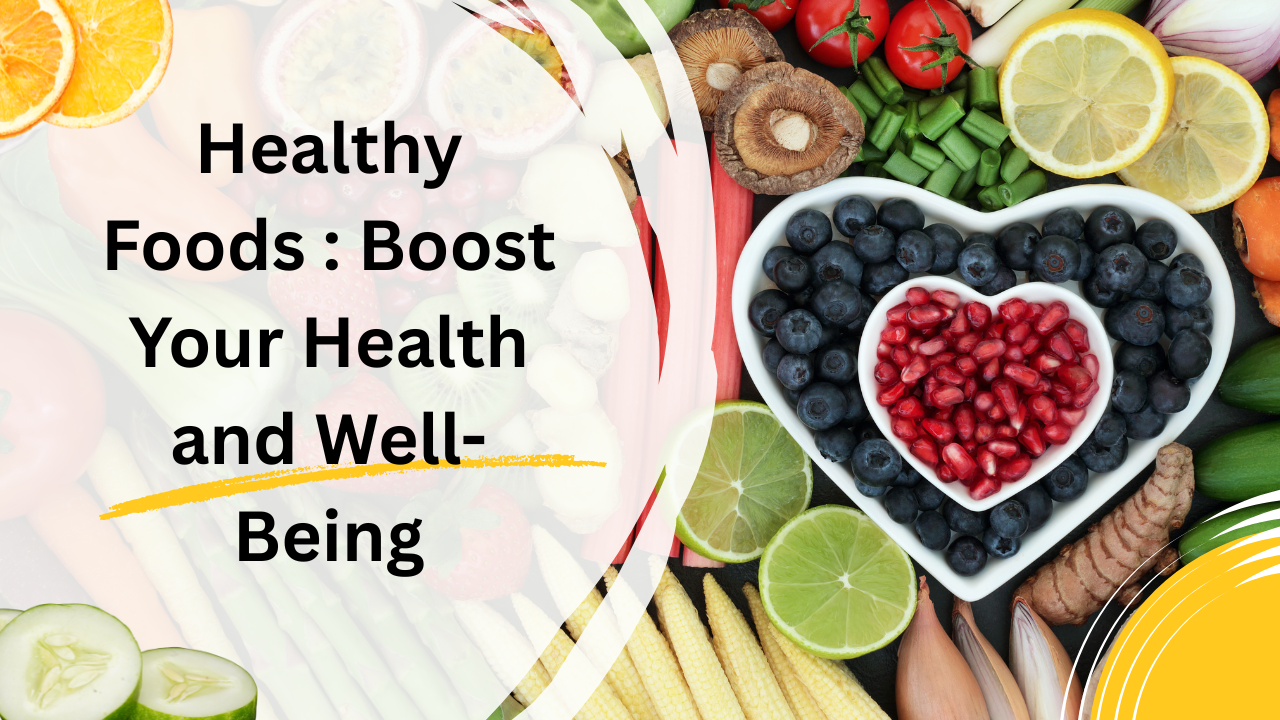Healthy lifestyle choices start with what we eat, and in today’s busy world, this matters more than ever. With so many fast meals, sugary treats, and ready-to-eat processed foods available, it’s easy to forget the importance of eating fresh, nutritious meals. Many people choose quick options instead of focusing on what their body truly needs, which can affect their long-term health.
Choosing to eat nutrient-dense, whole foods can have a profound impact on your overall well-being. Fresh fruits, vegetables, whole grains, lean proteins, and healthy fats provide the essential vitamins and minerals your body needs to function at its best. These foods not only support physical health but also improve mood, focus, and energy levels.
By gradually replacing processed foods with healthier alternatives, you can take control of your health. A balanced, nutritious diet helps boost immunity, reduce the risk of chronic diseases, and promote long-term vitality. Making mindful food choices every day is a powerful step toward a healthier, more vibrant life.
This article delves into the top 8 healthy foods that are packed with essential nutrients and will keep your body functioning at its best.
Top 8 Healthy Foods
Leafy Greens : A Powerhouse of Nutrients
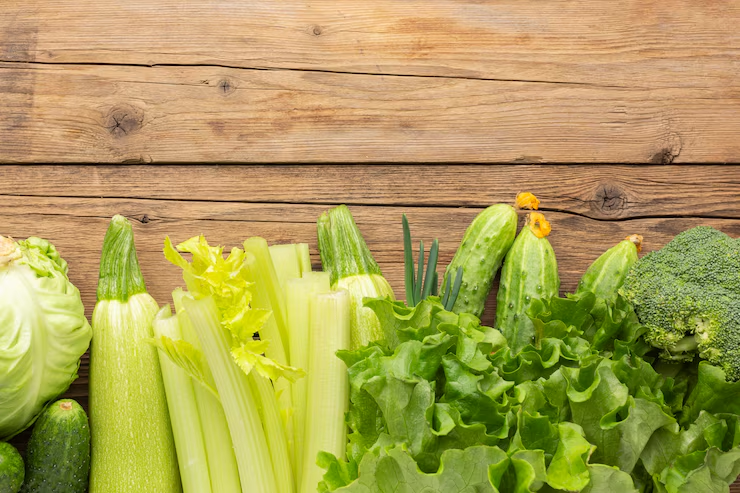
Leafy greens are some of the best healthy food you can include in your daily diet. Vegetables like spinach, kale, Swiss chard, and arugula are loaded with important nutrients such as vitamins A, C, and K, as well as iron, calcium, and fiber. Adding these greens to your meals can help improve your overall health and energy levels.
These healthy foods are also full of antioxidants, which help protect your body from damage caused by free radicals. They reduce inflammation, support heart health, improve digestion, and help maintain glowing skin. Whether added to salads, blended into smoothies, or included in cooked dishes, leafy greens offer many benefits.
Among various healthy foods, leafy greens stand out because they are low in calories but high in nutrition. They are an easy and effective way to build balanced meals, support wellness, and help prevent long-term diseases.
Why are Leafy Greens Healthy ?
Leafy greens such as spinach, kale, collard greens, and Swiss chard are packed with nutrients like:
Vitamin K: Essential for blood clotting and bone health.
Folate: Vital for cell division and healthy brain function.
Vitamin A: Supports eye health and immune function.
Iron: Helps in oxygen transport and energy production.
Fiber: Aids in digestion and helps maintain a healthy weight.
Health Benefits
Supports heart health: Leafy greens are rich in antioxidants and anti-inflammatory properties that help reduce the risk of cardiovascular diseases.
Boosts digestion: The fiber content aids in smooth bowel movements and improves gut health.
Improves skin health: The vitamins and minerals in leafy greens can help maintain glowing skin.
Easy Ways to Include Leafy Greens in Your Diet
Add spinach or kale to smoothies.
Toss some collard greens into a stir-fry.
Use lettuce and arugula for fresh salads.
Include Swiss chard into soups and stews.
Berries: The Antioxidant-Rich Superfood
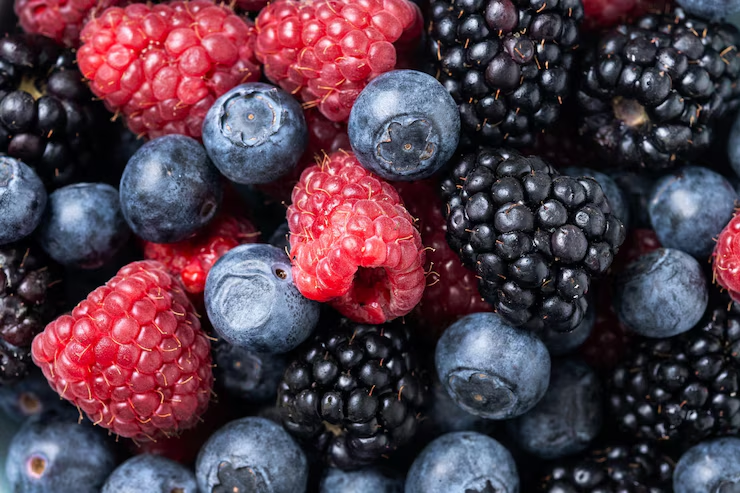
Berries are a perfect example of healthy food that combines taste with powerful nutrition. Whether it’s strawberries, blueberries, raspberries, or blackberries, these fruits are low in calories but rich in essential vitamins, especially vitamin C and fiber, which support overall health and digestion.
One of the key benefits of berries is their high antioxidant content. Antioxidants help protect the body from oxidative stress and inflammation, reducing the risk of chronic conditions such as heart disease and certain cancers. Their natural sweetness also makes them a great substitute for processed sugary snacks.
Including berries in your diet is a simple way to enhance your healthy food choices. They can be added to smoothies, oatmeal, salads, or enjoyed on their own. Versatile and nutrient-dense, berries are a delicious way to support your body and satisfy your sweet cravings without compromising your health goals.
Why are Berries Healthy ?
Berries such as blueberries, strawberries, raspberries, and blackberries are rich in:
Vitamin C: Supports immune function and promotes collagen production.
Antioxidants: Help fight oxidative stress and inflammation.
Fiber: Improves digestion and helps in weight management.
Manganese: Supports bone health and metabolism.
Health Benefits
Improves brain function: The antioxidants in berries, particularly in blueberries, can enhance memory and cognitive function.
Supports heart health: Regular consumption of berries can lower blood pressure and reduce the risk of heart disease.
Promotes weight loss: Due to their low-calorie and high-fiber content, berries can help curb hunger and improve digestion.
How to Include Berries in Your Diet
Add them to your morning oatmeal or yogurt.
Blend them into smoothies for a refreshing treat.
Sprinkle them over salads for a burst of color and flavor.
Snack on them fresh or freeze them for a cool treat.
Nuts and Seeds: Nutrient-Dense Snacks
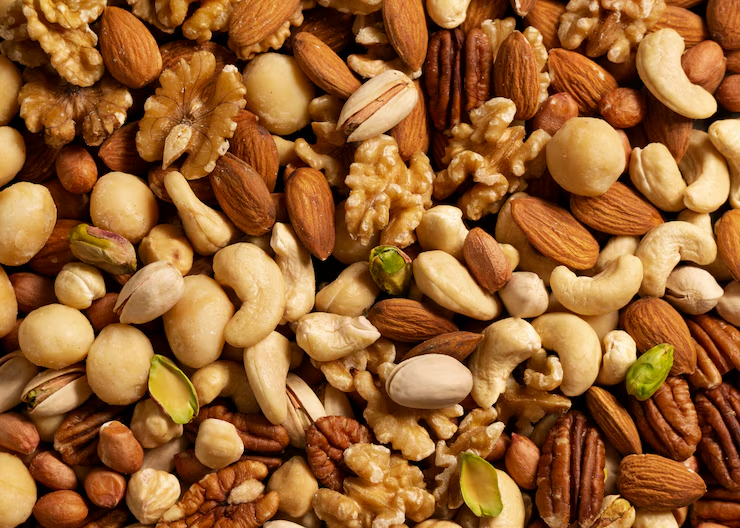
Nuts and seeds are excellent examples of healthy food that offer both taste and nutrition in every bite. Packed with essential nutrients like protein, fiber, magnesium, and healthy fats, they make for a convenient and satisfying snack option. Popular choices include almonds, walnuts, chia seeds, flaxseeds, and sunflower seeds.
These nutrient-dense foods support heart health, brain function, and digestion. The healthy fats found in nuts and seeds, particularly omega-3 fatty acids, help reduce inflammation and lower bad cholesterol levels. Their fiber content also aids in keeping you full, which can help with weight management and curb unhealthy cravings.
Including a handful of nuts or seeds into your daily diet—whether as a snack or added to meals—is a smart healthy food choice. They are easy to carry, require no preparation, and provide long-lasting energy, making them ideal for busy lifestyles focused on wellness and nutrition.
Why are Nuts and Seeds Healthy ?
Nuts like almonds, walnuts, and cashews, as well as seeds like chia seeds, flaxseeds, and pumpkin seeds, offer:
Healthy fats: Including omega-3 fatty acids, which are essential for brain function and reducing inflammation.
Protein: Vital for muscle repair and growth.
Fiber: Helps with digestion and weight management.
Magnesium: Supports muscle and nerve function.
Vitamin E: A powerful antioxidant that helps protect your cells from damage.
Health Benefits
Supports heart health: The healthy fats in nuts and seeds help lower bad cholesterol levels, reducing the risk of heart disease.
Helps with weight management: Despite being calorie-dense, the protein and fiber in nuts and seeds can help curb hunger and prevent overeating.
Improves brain health: Omega-3 fatty acids and antioxidants found in nuts and seeds promote cognitive function and may reduce the risk of neurodegenerative diseases.
Ways to Include Nuts and Seeds in Your Diet
Add a handful of mixed nuts to your morning cereal or yogurt.
Sprinkle chia seeds or flaxseeds over smoothies or salads.
Snack on roasted almonds or cashews.
Use nut butter (like almond or peanut butter) on whole-grain toast.
Avocados: The Healthy Fat Source
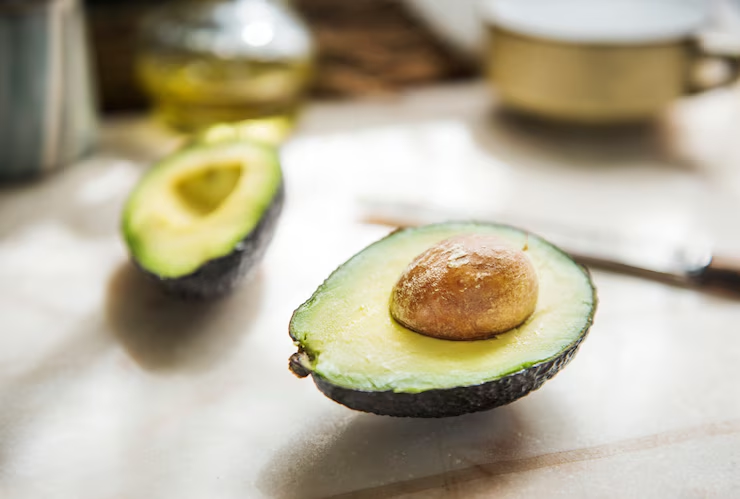
Avocados are a standout example of healthy food, often referred to as a “superfood” due to their impressive nutritional profile. They are rich in heart-healthy monounsaturated fats, which help lower bad cholesterol levels and support cardiovascular health. Despite being high in fat, avocados are incredibly nutrient-dense.
In addition to healthy fats, avocados provide essential vitamins and minerals like potassium, vitamin K, vitamin E, and B vitamins. They also contain fiber, which aids digestion and helps keep you feeling full longer—making them a great choice for weight management and overall wellness.
Whether added to salads, spread on toast, or blended into smoothies, avocados are a versatile and delicious way to enhance your meals. As a healthy food option, they offer both flavor and powerful health benefits, making them a smart addition to a balanced and nutritious diet.
Why are Avocados Healthy ?
Monounsaturated fats: The heart-healthy fats that help lower bad cholesterol.
Potassium: Helps regulate blood pressure and maintain proper heart function.
Vitamin E: An antioxidant that promotes healthy skin and eyes.
Fiber: Aids in digestion and helps with weight management.
Folate: Important for cell growth and development.
Health Benefits
Supports heart health: The healthy fats in avocados help lower cholesterol levels, reducing the risk of cardiovascular diseases.
Boosts skin health: Avocados are packed with vitamins and antioxidants that help maintain smooth, youthful-looking skin.
Improves digestion: The fiber content in avocados promotes a healthy digestive system and can prevent constipation.
Ways to Include Avocados in Your Diet
Add avocado slices to salads and sandwiches.
Blend into smoothies for a creamy texture.
Make guacamole for a tasty snack.
Spread avocado on whole-grain toast for a nutritious breakfast.
Salmon: A Protein-Packed Superfish

Salmon is a prime example of healthy food that combines taste, versatility, and exceptional nutrition. It’s one of the best sources of high-quality protein, which supports muscle repair, immune function, and overall body strength. Including salmon in your meals ensures you’re getting complete protein with all essential amino acids.
What truly sets salmon apart is its rich content of omega-3 fatty acids—healthy fats known for supporting heart health, reducing inflammation, and improving brain function. These fats are essential for your body but must be obtained through diet, making salmon a valuable addition to your eating plan.
Grilled, baked, or added to salads and bowls, salmon is a delicious and easy way to elevate your meals. As a healthy food choice, it supports long-term wellness and helps reduce the risk of chronic diseases. Eating fatty fish like salmon two to three times a week is highly recommended for optimal health.
Why is Salmon Healthy ?
Omega-3 fatty acids: These healthy fats help reduce inflammation and improve heart and brain health.
Protein: Supports muscle growth and repair.
Vitamin D: Essential for bone health and immune function.
B vitamins: Particularly B12, which helps with energy production and the formation of red blood cells.
Health Benefits
Promotes heart health: The omega-3 fatty acids in salmon can help reduce the risk of heart disease by lowering triglycerides and improving cholesterol levels.
Enhances brain function: Omega-3s are crucial for cognitive function and may reduce the risk of mental decline as you age.
Strengthens bones: The vitamin D in salmon helps improve bone density and reduces the risk of fractures.
How to Include Salmon in Your Diet
Enjoy grilled, baked, or pan-seared salmon fillets.
Add salmon to salads or grain bowls for extra protein.
Make a salmon pâté or dip for a healthy snack.
Prepare salmon sushi or sashimi for a low-carb option.
Sweet Potatoes: A Nutrient-Dense Carb Option

Sweet potatoes are a nutritious and tasty healthy food that serve as a great alternative to regular potatoes. They are rich in complex carbohydrates, fiber, and essential vitamins like vitamin A, vitamin C, and several B vitamins. Their vibrant orange color comes from beta-carotene, a powerful antioxidant that supports eye health and immunity.
Unlike regular white potatoes, sweet potatoes have a lower glycemic index, meaning they cause a slower, steadier rise in blood sugar levels. This makes them an excellent option for people managing diabetes or looking to maintain steady energy throughout the day.
Whether baked, roasted, or mashed, sweet potatoes are a versatile healthy food that fits well into a balanced diet. They pair well with lean proteins and vegetables, making them a delicious and satisfying addition to meals.
Why are Sweet Potatoes Healthy ?
Vitamin A: Crucial for eye health and immune function.
Beta-carotene: An antioxidant that helps protect your cells from oxidative damage.
Potassium: Helps regulate blood pressure.
Fiber: Aids digestion and promotes a healthy gut.
Vitamin C: Supports immune function and skin health.
Health Benefits
Supports vision: The high levels of beta-carotene in sweet potatoes promote healthy vision and may reduce the risk of macular degeneration.
Boosts immune system: Vitamin A and vitamin C in sweet potatoes help strengthen your immune defenses.
Improves digestion: The fiber in sweet potatoes promotes a healthy digestive system and regular bowel movements.
Ways to Include Sweet Potatoes in Your Diet
Roast or bake sweet potatoes as a side dish.
Mash them for a nutritious alternative to regular mashed potatoes.
Add roasted sweet potato cubes to salads or grain bowls.
Make a sweet potato smoothie for a filling breakfast.
Greek Yogurt: A Probiotic Powerhouse
Greek yogurt is a nutrient-rich healthy food that offers a powerful combination of protein, probiotics, and essential vitamins. It contains more protein than regular yogurt, which helps build muscle, keeps you full longer, and supports metabolism—making it a great option for breakfast or a mid-day snack.
In addition to protein, Greek yogurt is loaded with probiotics, which are beneficial bacteria that promote a healthy gut. A well-balanced gut microbiome supports digestion, boosts the immune system, and may even improve mood. It’s also a good source of calcium, vitamin B12, and potassium.
Versatile and delicious, Greek yogurt can be enjoyed on its own, with fruit and nuts, or as a base for smoothies and sauces. As a healthy food, it’s both convenient and satisfying, making it an excellent choice for anyone aiming to improve their nutrition and overall well-being.
Why is Greek Yogurt Healthy ?
Protein: Helps build and repair tissues, and keeps you feeling full longer.
Probiotics: Supports gut health and boosts the immune system.
Calcium: Essential for strong bones and teeth.
Vitamin B12: Important for energy production and brain health.
Health Benefits
Improves digestion: The probiotics in Greek yogurt promote a healthy balance of gut bacteria, which is essential for digestion and overall gut health.
Supports bone health: Greek yogurt is an excellent source of calcium, which is crucial for maintaining strong bones and teeth.
Boosts immunity: Probiotics help strengthen the immune system and prevent infections.
Ways to Include Greek Yogurt in Your Diet
Add it to smoothies for a creamy texture.
Enjoy it with fresh berries and a drizzle of honey for a healthy snack
Quinoa: The Complete Plant Protein
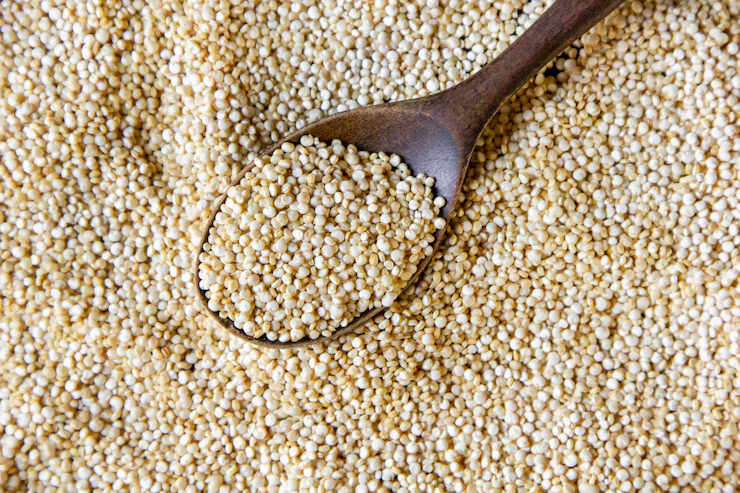
Quinoa is a highly nutritious and versatile healthy food that has gained popularity for its impressive health benefits. Although technically a seed, it’s commonly treated as a whole grain due to its texture and culinary uses. Quinoa is naturally gluten-free, making it an excellent option for those with gluten sensitivities.
One of quinoa’s standout features is its status as a complete plant-based protein. It contains all nine essential amino acids, which is rare among plant foods. This makes quinoa a valuable protein source for vegetarians, vegans, and anyone looking to add more plant-based options to their diet.
In addition to protein, quinoa is rich in fiber, iron, magnesium, and antioxidants. It’s easy to prepare and can be used in salads, soups, or as a side dish. As a healthy food, quinoa supports heart health, digestion, and sustained energy, making it a smart addition to any balanced meal plan.
Why is Quinoa Healthy ?
Complete protein: It contains all nine essential amino acids, making it one of the few plant-based sources of complete protein.
Fiber: Helps with digestion, supports heart health, and promotes healthy blood sugar levels.
Iron: Essential for energy production and the formation of red blood cells.
Magnesium: Important for muscle function, nerve function, and energy production.
B vitamins: Vital for metabolism and overall cell function.
Health Benefits
Promotes muscle repair and growth: As a complete protein, quinoa is excellent for muscle recovery and building.
Supports heart health: Its high fiber content helps lower cholesterol levels and regulate blood pressure.
Helps with weight management: Quinoa’s high protein and fiber content keep you feeling full longer, which can help with portion control and weight loss.
Improves digestion: The fiber in quinoa aids in smooth bowel movements and maintains gut health.
Ways to Include Quinoa in Your Diet
Use quinoa as a base for salads or grain bowls.
Make a savory quinoa stir-fry with vegetables and lean protein.
Enjoy quinoa as a breakfast cereal, topped with fruits and nuts.
Substitute quinoa for rice or couscous in various dishes.
Conclusion

In conclusion, choosing healthy foods is one of the most important steps you can take to support your body and mind. A diet rich in fruits, vegetables, whole grains, lean proteins, and leafy greens provides essential vitamins, minerals, and fiber needed for energy, growth, and repair.
These foods help lower the risk of chronic diseases, improve digestion, boost immunity, and promote mental clarity and focus. Making small changes—like replacing processed snacks with fresh fruits or adding more vegetables to your meals—can make a big difference over time.
Healthy foods not only nourish the body but also help maintain a healthy weight and support overall well-being. When you choose nutritious meals daily, you’re investing in a stronger, more vibrant life. Whether you’re young or old, eating well plays a key role in living a longer and more active life. Embrace healthy foods as a natural way to feel better every day.
FAQs
- What are the benefits of eating healthy food ?
Eating healthy food provides your body with the essential nutrients it needs to function optimally. It supports heart health, boosts energy levels, improves digestion, strengthens the immune system, and helps prevent chronic diseases such as diabetes, obesity, and certain cancers. Healthy foods also improve skin health, mental clarity, and help maintain a healthy weight. - Can I eat healthy food and still enjoy my meals ?
Absolutely! Healthy food can be delicious and enjoyable. Incorporating a variety of flavors, textures, and ingredients into your meals ensures they are both nutritious and satisfying. For example, you can enjoy a rich avocado toast, a vibrant berry smoothie, or a savory quinoa salad. - How can I make my meals more nutritious ?
To make your meals more nutritious, focus on including a variety of whole foods, such as fruits, vegetables, whole grains, lean proteins, and healthy fats. Swap processed ingredients for whole grains like quinoa or brown rice, include colorful vegetables like spinach or bell peppers, and add healthy fats from sources like avocados or nuts. - Are plant-based foods just as healthy as animal-based foods ?
Yes, plant-based foods can be just as nutritious, if not more so, than animal-based foods. Many plant-based foods like leafy greens, legumes, nuts, seeds, and whole grains are packed with fiber, vitamins, minerals, and antioxidants that promote good health. - How do I know if a food is truly healthy ?
A food is generally considered healthy if it is minimally processed and contains a high amount of essential nutrients like vitamins, minerals, fiber, and antioxidants. Whole foods such as fresh vegetables, fruits, lean proteins, nuts, seeds, and whole grains are typically the healthiest choices.


